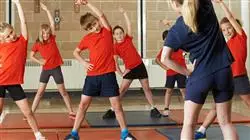
University certificate
The world's largest faculty of education”
Description
With this program, you will progress in the application of innovative pedagogical models, applying the latest advances in the area of Physical Neuroeducation"

In recent times, neurosciences have become a revolutionary way of understanding almost all areas of the human body. Its logic is indisputable: the brain, as the moderator, organizer and creator holds the keys to these processes. New scientific procedures for brain exploration have opened the door to a deeper understanding of all these cognitive processes.
In this scenario, the subject of Physical Education is among the teaching subjects that benefit from these advances, taking a leap towards a new way of understanding the discipline. At this point, Neuroeducation in Physical Education becomes a powerful working tool. That is why TECH has designed this professional master’s degree, which will allow the teaching professional to intensively learn about the bases of neuroscience, the motor practices that affect brain development or the educational tools and strategies that favor Physical Neuroeducation.
Likewise, through a theoretical-practical approach, students will learn about invisible training in brain development and the benefits of sports practice for the prevention of diseases such as Alzheimer's or Parkinson's disease. The multimedia material will favor the acquisition of knowledge in a more dynamic and visual way.
The professional is, therefore, facing an excellent opportunity to progress in their professional career through a university program provided in a convenient and 100% online format. As such, students only need a computer, tablet or cell phone, with which they can connect from anywhere and at any time to the entire syllabus available on the virtual platform. Thanks to this, they will have the possibility to distribute the workload according to their needs. This professional master’s degree is flexible, highly useful and compatible with professional and personal responsibilities.
Thanks to this program you will be able to effectively use gamification and gamification strategies to promote neurophysical learning in children"
This professional master’s degree in Neuroeducation and Physical Education contains the most complete and up-to-date program on the market. The most important features include:
- Case studies presented by experts in Neuroeducation and Physical Education
- The graphic, schematic, and practical contents with which they are created, provide scientific and practical information on the disciplines that are essential for professional practice
- Practical exercises where the self-assessment process can be carried out to improve learning
- Special emphasis on innovative methodologies
- Theoretical lessons, questions to the expert, debate forums on controversial topics, and individual reflection assignments
- Content that is accessible from any fixed or portable device with an Internet connection
Advance your professional career with a university program that will guide you to successfully apply the latest advances in Neuroeducation"
The program’s teaching staff includes professionals from the sector who contribute their work experience to this program, as well as renowned specialists from leading societies and prestigious universities.
The multimedia content, developed with the latest educational technology, will provide the professional with situated and contextual learning, i.e., a simulated environment that will provide immersive education programmed to learn in real situations.
This program is designed around Problem-Based Learning, whereby the professional must try to solve the different professional practice situations that arise throughout the program. For this purpose, the student will be assisted by an innovative interactive video system created by renowned and experienced experts.
Gain 24-hour access to the most up-to-date content on Neuroeducation and put it into practice in your sessions. Enroll now"

Incorporate the neuroscience approach to the area of Physical Education and provide your students with the cognitive and emotional development of this new form of intervention"
Objectives
The main objective of this professional master’s degree is to offer the vision and skills necessary to turn the area of Physical Education into a tool of incalculable utility for the development of the integral well-being of the human being. In addition to its potential in physical terms, in this program the students will get an exhaustive learning experience on the protective capacity of the brain, its influence on brain function, emotions, motivation and perception. In short, the focus is on learning.

Using the most advanced online technology, this program will provide you with the necessary tools to apply cooperative learning in sports in your classes"
General Objectives
- Know the basis and main elements of Neuroeducation
- Integrate the new contributions in brain science in teaching-learning processes
- Discover how to enhance brain development through motor action
- Implement the innovations of Neuroeducation in the subject of Physical Education
- Achieve specialized training as a Neuroeducation professional in the field of motor action
Specific Objectives
Module 1. Fundamentals of Neurosciences
- Describe the functioning of the nervous system
- Explain the basic anatomy of structures related to learning
- Define the basic physiology of learning-related structures
- Identify the main brain structures related to motor skills
- Define the plastic brain and neuroplasticity
- Explain the effects of the environment on brain development
- Describe the changes in the infant's brain
- Explain the evolution of the adolescent brain
- Define the characteristics of the adult brain
Module 2. Neuroeducation
- Define the principles of Neuroeducation
- Explain the main neuromyths
- Explain strategies for early stimulation and interventions
- Define the theory of attention
- Explain emotion from a neurological point of view
- Explain learning from a neurological point of view
- Explain memory from a neurological point of view
Module 3. The Incidence of Emotions in Neuroeducational Processes Based on Motor Action
- Explain the emotional brain
- Describe the emotional process from a neuroscientific perspective
- Describe the main brain structures that make up the emotional process
- Define the role of emotion in the processes of learning and memory
- Describe the brain reward system
- Explain the basis of emotion education
- Describe emotional competencies
- Explain emotional chemistry in response to motor action
- Define the role of motor action in emotional changes
Module 4. The Social Brain in Motor Action from a Neuroscientific Perspective
- Describe mirror neurons
- Explain complex social functions
- Describe the role of motor action in the development of social health
- Explain the social relationship in personal wellbeing
- Explain the implication of mental health and interpersonal relationships
- Define the relevance of cooperation from a neuroeducational perspective
- Explain the importance of climate in learning environments
Module 5. Impact of Motor Action on Brain Learning Processes and on Health Development
- Explain the main neurotransmitters and hormones related to motor practice and learning ability
- Apply strategies for disease prevention and improvement of quality of life in terms of cardiovascular and other risk diseases
- Describe the different motor tasks that have an impact on brain development
Module 6. Physical Neuroeducation and Learning
- Explain the relevance of body-brain language together with embodied cognition
- Establish the importance of mental health with exercise
- Explain the development of cognitive functions through the practice of physical exercise
- Know the positive influence of motor skills in students with learning difficulties
Module 7. Motor Practices Affecting Brain Development
- Know the importance of expressive, artistic activities and brain development from a socioemotional perspective
- Identify outdoor activities and brain development
- Establish the anaerobic and aerobic physical activities that promote brain development in young people
Module 8. Invisible Training in Brain Development
- Understand the role of the main myokines in relation to exercise and health
- Identify new postulates for disease prevention and improvement of quality of life in cardiovascular risk diseases (obesity, diabetes or metabolic syndrome)
- Analyze the relevance of body posture from a neuroscientific point of view
Module 9. Pedagogical Models and Evaluation in Physical Neuroeducation
- Know the conceptual approach of the terms related to methodology in Physical Education
- Carry out an assessment of the teaching-learning process in Physical Neuroeducation
- Learn about cooperative learning models and apply them in the sports field
Module 10. Methodologies, Methods, Tools and Teaching Strategies Favoring Physical Neuroeducation
- Learn about new teaching methodologies through the Flipped Classroom
- Use gamification and gamification strategies to promote children's neurophysical learning
- Know other methods, tools and teaching strategies that would be promoted through Physical Neuroeducation

Take the opportunity and take the step to get up to date on the latest developments in Neuroeducation and Physical Education"
Professional Master's Degree in Neuroeducation and Physical Education
If there is an element to which we owe the configuration of memory and the ability to store new information, it is brain plasticity: this attribute of the primary organ is the one that facilitates the creation of new neural connections providing the human being with adaptive facility. Physical activity is one of the mechanisms to improve this plasticity, therefore, in TECH Technological University we have developed the Professional Master's Degree in Neuroeducation and Physical Education: a program developed with the highest curricular standards that allows the approach to neurosciences from a novel and practical approach. It is known from studies that learning motor skills can optimize cognitive functions, which is why locomotion and the reinforcement of the musculoskeletal system through exercise play a fundamental role in this postgraduate program. Do you want to acquire new training skills that will give a new dimension to your professional profile? We help you make it happen with our innovative 100% online methodology based on the Relearning system.
Neuroeducation: a must-have addition to your curriculum
Since ancient times, physical education stands out as one of the pillars that helps to sustain health in its ideal conditions. It is, however, since the incursion into the study of brain structures, that experts have been able to establish a strong link between the development of physical activities and mental health. Exercising causes the activation of neurotransmitters such as dopamine, serotonin and norepinephrine, essential in the regulation of stress and the stimulation of pleasure; proteins that help repair the nervous system are also released and neurogenesis occurs: the formation of new neurons. By accessing our program you will be able to incorporate systematic knowledge into your career that will allow you to be a catalyst of these benefits, thus creating a great impact on pedagogical models. We offer you the finest in professionalization with a dynamic and effective format that demonstrates why we are the number one online university in the world; transform your life at the click of a button.






